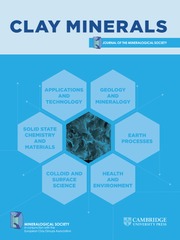Article contents
Comparison between thermally-stimulated current and complex impedance spectroscopy measurements on a dehydrated Ca-montmorillonite
Published online by Cambridge University Press: 09 July 2018
Abstract
The polarization conductivity, σ'(ω) of a Ca-montmorillonite has been determined by complex impedance spectroscopy. The technique of thermally-stimulated currents (TSC) leads to the determination of the different relaxation parameters, such as the distribution function of the different relaxation processes. The results demonstrated the coherence of the two approaches, and confirmed that the conducting phenomenon is due to the hopping of charge carriers between localized sites. The energy corresponding to the hopping process is evaluated using two different methods of analysis of the TSC signal. The values obtained are compared to those observed on a Na-montmorillonite.
Keywords
- Type
- Research Article
- Information
- Copyright
- Copyright © The Mineralogical Society of Great Britain and Ireland 2000
References
- 3
- Cited by


